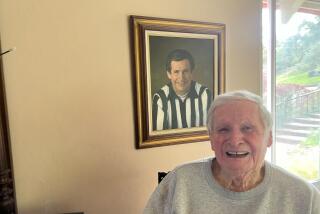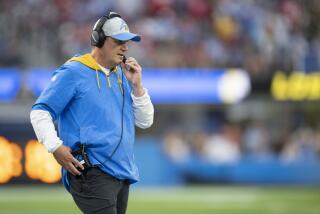Putting On a New Face
- Share via
PITTSBURGH — He rode into town in 1992, grabbing a successful but stagnating team by its football cleats and shaking out years of lethargy.
His players, some only months younger, responded enthusiastically to a coach with spontaneity and raw energy. A team that had lost for five of the previous seven years immediately started winning, barely stopping for a breath during six straight successful seasons.
He was the NFL coach of the year well before 40, a well-paid endorser whose commercials seemed to pop up every 10 minutes of every game on TV. His news conferences were televised live, with fans scheduling lunch hours around it so they didn’t miss his evangelicallike philosophizing, a mix of a Knute Rockne halftime talk and a you-must-buy-now sales pitch.
Even when his temper and ambition overwhelmed him--when he sprayed his punter with spittle and salty expletives for shanking a punt or barely restrained himself from tackling an opposing defensive back returning a game-winning interception--it merely reinforced his image as a man who would accept nothing less than winning. Every game, every season.
Then Bill Cowher lost it.
Assistant coaches and some of his best players started to leave and the team struggled. But for 2000, the man known as Face refuses to accept another season of losing.
“I’m kind of looking forward to re-establishing some things around here,” Cowher said. “Losing gnaws at me. I don’t like losing. I don’t like losing at anything I do. I’ve always said that the day you start accept losing, it’s time to get out. The day I start accepting losing, I need to get out of it.”
The 43-year-old Cowher will be less patient this season, especially with Kordell Stewart, whom he skillfully metamorphasized into his multidimensional “Slash” role early in his career.
Cowher will be less tolerant of mistakes by all of his players. It’s not just a season that is on the line now, he knows, but his career as a football coach in his hometown.
But the Steelers might have trouble avoiding another tough season if Stewart struggles again, the offensive line doesn’t improve and division rivals Tennessee, Jacksonville and Baltimore are as good as predicted.
“I understand the last two years, the disappointments, the frustrations, based on the expectation levels, we created around here,” Cowher said. “I know accountability stops with the guy at the top, and I’m ready to accept that.”
The recent downfall of the Steelers began in 1998, just two seasons after the Dallas Cowboys beat them in the Super Bowl, the franchise’s first loss in five trips there. Pittsburgh made the playoffs in 1996 and ‘97, but hasn’t even played .500 ball since.
First, it was assistant coaches who left Cowher, a special teams coach here, a coordinator there, some for lesser duties on losing teams just so they could get away from a personality that could be as suffocating as it was motivating.
Then, many of the players who had carried him and the Pittsburgh Steelers to the Super Bowl and three AFC championship games in four years took off, too. Their loyalty to Cowher, it seemed, lasted only until others came waving paychecks with many zeros.
Rod Woodson. Greg Lloyd. Neil O’Donnell. Leon Searcy. Yancey Thigpen. Kevin Greene. Chad Brown. Duval Love. Eric Green. Carnell Lake. All but O’Donnell went to the Pro Bowl, all of them left. What they left behind wasn’t pretty.
The turnaround came precipitously and unpredictably, surprising Cowher with the stunning suddenness of a crackback block. After years of successfully replacing $5 million free agents with $1 million fill-ins from the NFL’s bargain basement, the Steelers ran out of talent and resourcefulness. About the same time, many players simply ran out of tolerance for Cowher.
They tuned out his screaming and sideline antics, almost as if they all hit the mute button at the same time. They didn’t listen, they didn’t respond and, as two successive losing seasons progressed, they didn’t win.
The pattern was the same: The Steelers won early, threatened to again be a force in the AFC Central, only to smack into the artificial turf with a thud in the second half of the season. They lost their final five to finish 7-9 in 1998 and seven of their final eight to go 6-10 in 1999, the team’s worst season in 11 years.
It wasn’t just how many they lost, but how they lost.
Stewart didn’t seem to have a clue at quarterback after a breakthrough season in 1997. It didn’t help that he was working with his third offensive coordinator in three years. Or that the secondary was a sieve. Or that the offensive line, traditionally strong even in years the franchise was weak, was an ever-shifting mishmash of unfamiliar faces.
Most of all, the blame fell on Cowher, and all the talk wasn’t about him as a football coach, either.
Just as Stewart had the year before when rumors about his off-field affairs swirled, Cowher stood before the Steelers at a team meeting and denied rumors about his personal life. His wife, Kaye, a former pro basketball player he met when both were students at North Carolina State, also defended her husband of 16 years -- a man she called her “soul mate” -- and their marriage.
Asked about rumors about her husband’s infidelity, she told the Pittsburgh Post-Gazette, “Absolutely no truth to it. My husband being attacked for calling the wrong plays or using the wrong players goes with the territory, but it has crossed the line.” Cowher himself called the rumors “ridiculous, absurd.”
Regardless of what was happening away from the field, what was occurring on it might have gotten many NFL coaches fired. As the Steelers lost, they also lacked discipline and direction, with Wayne Gandy, Troy Edwards and Lee Flowers all fined by the league for late-season transgressions in 1999.
But while many in Pittsburgh thought Cowher deserved to be fired, owner Dan Rooney didn’t.
A man who has changed coaches only once in 31 years, who believes consistency and continuity are as important to winning as talent, Rooney had on his desk at season’s end the resignations of two men, Cowher and director of football operations Tom Donahoe. Both had decided they could no longer work together. But, in a surprise, Rooney accepted only Donahoe’s.
During a postseason meeting with Rooney that might have saved his job, Cowher promised to pump his “heart and soul” into rebuilding the Steelers. So far, it seems he has kept his promise.
He has worked much more closely with new director of football operations Kevin Colbert than he did with Donahoe, whom he had come to distrust. He went on scouting trips, something he rarely did before. He worked his players harder than before in preseason camp, trying to revive a passion for winning he felt had escaped them as they lost 15 of their last 21 games. Never heavy, he even dropped weight, giving him a hungrier, even meaner look.
“We’ve set our expectations high,” linebacker Levon Kirkland said. “The last couple of years, we had a lot of excuses--if this had happened, or that had happened. This year, if we keep working hard and caring about the guys around us on the field, I think we can have a good year.”
How good must the Steelers be for Cowher to keep his job? Rooney isn’t dropping any hints, saying only that “everybody needs to win every year.” However, he seems happy with a reinvigorated Cowher, whose presence seemed to be everywhere during training camp.
“Bill has been really terrific,” Rooney said. “His attitude couldn’t have been better, his enthusiasm, going into the draft and up here” at camp.
More to Read
Go beyond the scoreboard
Get the latest on L.A.'s teams in the daily Sports Report newsletter.
You may occasionally receive promotional content from the Los Angeles Times.










